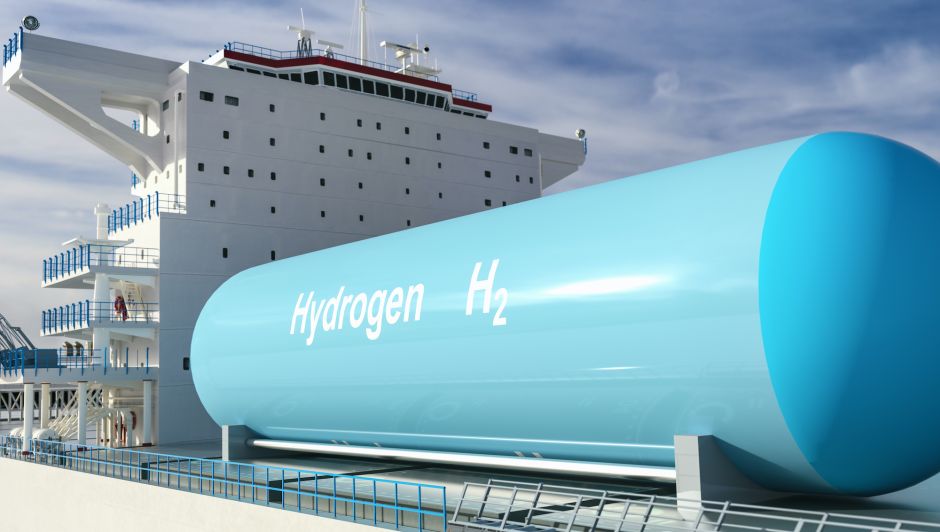Not obvious that LOHC will be a good marine fuel

It is neither suitable for ocean traffic nor for most shorter distances. Potentially, hydrogen stored in liquid form using organic molecules (LOHC) can be used as a fuel in certain short-term traffic that is not suitable for electrification. This according to a new report from Lighthouse and the Swedish Transport Administration.
Hydrogen is increasingly being singled out as one of the solutions needed to achieve future climate goals in various sectors. However, as a marine fuel, hydrogen has a major disadvantage – it takes up a lot of space. To be stored more efficiently, it therefore needs to be cooled down in liquid form or converted to other hydrogen carriers such as ammonia, methanol or methane – processes that require a lot of energy.
Another possible solution is to store hydrogen with liquid organic hydrogen carriers, so-called LOHC (Liquid Organic Hydrogen Carriers). The concept involves binding hydrogen to a chemical from which the hydrogen can then be released while the liquid returns to its original liquid form. In this way, the hydrogen carrier can be reused.
But how big is the potential for the concept to work for shipping? In the pre-study Handling of hydrogen in liquid form as LOHC from a shipping perspective, researchers from IVL and Chalmers have taken a closer look at possible technical solutions and at the initiatives underway in the area.
“There is research that is skeptical that this will be the most interesting solution for shipping, but also projects where you are clearly more positive about testing this. It is therefore not possible, based on today's state of knowledge, to fully assess the concept of LOHC as a hydrogen carrier for shipping. For some segments it might work, but it is probably not suitable for really long distances, but is more interesting for short distances and then mainly those that cannot be electrified. For example, a company has ordered seven service vessels for offshore operations that are to be prepared for the implementation of LOHC technology, and one has already been delivered”, says Julia Hansson, researcher at the IVL Swedish Environmental Research Institute who, together with her colleague Anders Hjorth, led the work on the pre-study.
The study also takes a closer look at LOHC as a way to transport hydrogen by ship. Here, too, many uncertainties remain, for example around costs and the space it takes up on board.
“There are a number of projects on how to generally transport hydrogen via LOHC. Therefore, it is not completely uninteresting, but it is likely not the first thing that will happen in the future.”
The major advantage of LOHC is said to be that existing infrastructure – tanks, pipelines, cisterns and other things on ships and in ports could be used.
“It appears possible, but does it require any kind of changes? And if so, how costly are they? You would need to know a little more about that. The use of LOHC has not been tested on a large scale in shipping”, says Anders Hjort.
Another issue that needs further study is which LOHC(s) are most suitable as hydrogen carriers. Some substances can be toxic, while others require more heat than others to release hydrogen from the liquid.
“If the hydrogen gas is to be used as fuel, heat is required to disconnect it from the liquid. Where do you get that heat on a ship? Is there enough excess heat on board or is a heat source needed?”
According to the preliminary study, previous studies comparing LOHC with other solutions indicate that other fuel options may be more interesting for the segments studied. But that said, LOHC can be an interesting option for some marine applications. However, more comparisons, analyzes and testing of LOHC are needed before any definitive conclusions can be drawn about its potential compared to other hydrogen alternatives, states the report. Other hydrogen alternatives are also under development, which affects the conditions and potential for LOHC.
The pre-study Handling of hydrogen in liquid form as LOHC from a shipping perspective has been carried out within the Swedish Transport Administration's industry program Sustainable shipping which Lighthouse runs and authored by Anders Hjort (IVL Swedish Environmental Institute), Julia Hansson (IVL/Chalmers), Jenny Trinh (IVL), Desirée Grahn (IVL), Selma Brynolf (Chalmers) and Karl Jivén (IVL).
-
 NextWave – en podd som ska locka unga
NextWave – en podd som ska locka unga -
 Ny studie: Eldrivna pendelbåtar kan effektivisera Stockholms kollektivtrafik
Ny studie: Eldrivna pendelbåtar kan effektivisera Stockholms kollektivtrafik -
 Sjöfartens utsläpp ökar
Sjöfartens utsläpp ökar -
 Sociala relationer påverkar val av bränsle
Sociala relationer påverkar val av bränsle -
 Sjöfartens omställning kräver ”mjukare” påtryckningar
Sjöfartens omställning kräver ”mjukare” påtryckningar -
 Hon hade avtalad tid med Kapten ynkrygg
Hon hade avtalad tid med Kapten ynkrygg -
 Lighthouse omvärldsanalys 2025 – osäkerhet och tullar präglar sjöfarten
Lighthouse omvärldsanalys 2025 – osäkerhet och tullar präglar sjöfarten -
 Se seminariet Shipping in the Marine Environment
Se seminariet Shipping in the Marine Environment -
 Vad betyder egentligen de 90 procenten?
Vad betyder egentligen de 90 procenten? -
 Hålla där...
Hålla där...

